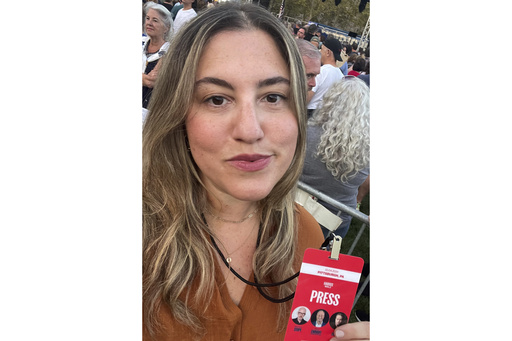
The initial announcement from the now-abandoned Trump administration’s directive to halt federal loans and grants was revealed by a journalist operating out of her Brooklyn apartment, rather than a large news outlet. Marisa Kabas’ recent scoop marks a critical moment for a rising group of independent journalists who curate and analyze news while branding themselves independently. Many in this wave of journalism have moved away from traditional media organizations, while others, like Kabas, are newcomers uncertain about conventional career paths.
“This week has transformed my career,” Kabas mentioned during an interview. “It feels like my job has shifted overnight.” On a chilly Monday, she reviewed her emails at her kitchen table when a source provided her with a memo from the Office of Management and Budget’s acting director announcing the spending freeze. Although she runs her own website, The Handbasket, Kabas opted to share a screenshot of the memo on the social media platform Bluesky to increase its visibility.
She found herself anxious while awaiting reactions to her post, opting for a calming walk on that cold night. Acknowledging the reality that many consider news significant only when covered by major outlets, she experienced a mixture of excitement and anxiety. Just three hours after her post, The Washington Post released a story acknowledging Kabas’ efforts, which supported her findings. The memo incited considerable backlash, prompting the administration to retract its directive just two days later.
A brief look into Kabas’ background reveals a journey through various positions in journalism and public relations, coupled with freelance work for platforms like MSNBC.com and the Huffington Post. She established her website in 2022, originally using it for personal writing, before fully committing to journalism the following year. Going independent allows her the freedom to cover topics she’s passionate about, stating, “I get to write about things that interest me, rather than being assigned pieces I’m not invested in.” However, the independence also means she must hustle alone to build her career.
Kabas has explored various subjects in her writing, offering both essays and investigative pieces on topics such as the controversial ex-congressman George Santos and the role of Elon Musk in tech. Just like many in the field of independent journalism, her work often reflects her personal opinions. In fact, she described the OMB memo as “a truly unhinged document that sounds like it was written by the world’s most petty 4Chan poster.”
Greg Munno, a journalism professor, emphasizes the importance of personality within independent journalism, noting, “She brings a unique attitude that resonates with readers and potential sources.” A wide array of journalists is thriving in this independent space, utilizing platforms like Substack and Beehiiv. Seamus Hughes curates legal documents through Court Watch, while Heather Cox Richardson juxtaposes historical analysis with current political issues in her series, Letters From an American.
Other notable independent contributors include Casey Newton, who explores tech trends through his publication, Platformer and even acknowledges the missteps in sports predictions within Molly Knight’s The Long Game. Oliver Darcy, previously with CNN, created his own site, Status, focusing on media commentary, while former Washington Post staff have launched their platforms, like Jennifer Rubin’s The Contrarian and Taylor Lorenz’s User Mag.
Recently, CNN anchor Jim Acosta announced he would venture into independent journalism using Substack after turning down a move to a less favorable time slot. In a significant commentary, Dan Rather, a veteran journalist, remarked on social media that “Independent journalism is now the way forward,” reflecting frustrations with traditional media’s accountability.
The realm of independent journalism encompasses a broader spectrum, including influential podcasters and social media commentaries through platforms like TikTok and YouTube, which have increased their presence, especially during presidential elections. Jeremy Littau, a journalism professor, raises concerns about the decline of traditional news, indicating a need for new sources to fill that void.
While the rise of independent journalism presents exciting opportunities for diverse voices, the challenge remains in determining trustworthiness in reporting. As Littau points out, the credibility of these individual journalists is crucial, particularly in the age of breaking news, where standards may not be consistently upheld.
Munno expresses skepticism about whether there will be sufficient demand to support a sustainable independent journalism ecosystem. Before her recent scoop, Kabas had maintained what she referred to as a modest living from her work, with her income derived from dedicated subscribers to The Handbasket. Post-scoop, her subscriber count surged from around 800 to approximately 1,500 in the span of just one week.
This experience has prompted Kabas to reconsider the focus of her work, recognizing the pressing need to provide in-depth reporting on the evolving political landscape. She is even contemplating the possibility of hiring an additional reporter to aid her efforts. “I’ve transitioned from taking time to reflect and write personally to engaging as a breaking news reporter,” she said, highlighting the distinct skill sets required for each role.

